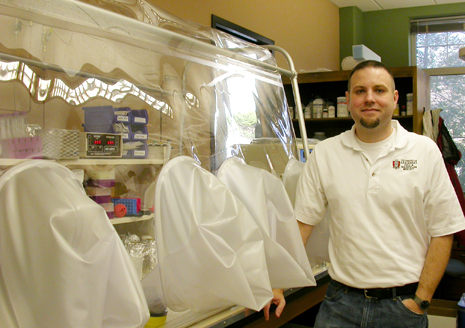
FAYETTEVILLE, Ark. – A key component found in an ancient anaerobic microorganism may serve as a sensor to detect potentially fatal oxygen, a University of Arkansas researcher and his colleagues have found. This helps researchers learn more about the function of these components, called iron-sulfur clusters, which occur in different parts of cells in all living creatures.
Daniel Lessner, assistant professor of biological sciences, and his colleagues report their findings in the Journal of Biological Chemistry.
Lessner studies methanogens, ancient anaerobic microorganisms that live in extreme environments, including the human gut. In these organisms, he looks at RNA polymerase, a protein that “reads” DNA and produces RNA, which contains codes to build proteins. This process is found in most of the things we think of as “living.”
Methanogens interest space scientists because they can survive in extreme temperature conditions and in hostile environments. They interest health researchers because some species found in the human gut may influence digestion. They also interest energy producers because they are the only life form that produces methane gas. Because of this, it’s important to understand how these ancient microscopic creatures work.
The iron-sulfur clusters also are important because they exist in most life forms, including humans – in fact, you could not survive without your iron-sulfur clusters. “It is likely that life evolved at the interface of iron and sulfur minerals,” Lessner said. In some methanogens and other single-celled organisms, the protein RNA polymerase contains iron-sulfur clusters. However, these iron-sulfur clusters are not typically found in this protein, except in certain species, including methanogens.
Better understanding of the role of iron-sulfur clusters in this simple organism will help scientists understand and perhaps control production pathways in these microorganisms to produce methane gas as a biofuel.
The researchers decided to see if they could figure out why these organisms contain iron-sulfur clusters in their RNA polymerase. They found that without the clusters, a part of the protein changed its shape, which would in turn change its interactions with other parts of the protein. The clusters might serve to regulate the assembly of the parts of RNA polymerase.
The researchers believe that the iron-sulfur clusters serve as a sensor to shut down the creation of RNA from DNA in the presence of oxygen because oxygen reacts with iron-sulfur clusters to destroy them. This in turn would help the methanogen survive.
“This may be a way to conserve energy,” Lessner said. “Organisms may have retained these clusters to serve a similar role in diverse species so that organisms can respond to changes in the environment.
“This is the first step in figuring out the protein properties and seeing how it works,” he said. Next the researchers will genetically modify the protein to change the number of iron-sulfur clusters and see what happens.
This paper was made possible by a National Science Foundation grant.
Contacts
Dan Lessner, assistant professor, biological sciences
J. William Fulbright College of Arts and Sciences
479-575-2239,
Melissa Blouin, director of science and research communication
University Relations
479-575-3033,